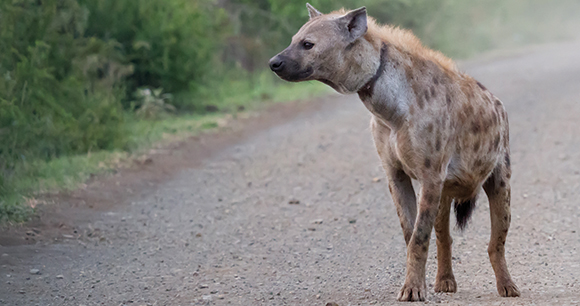Simple Snares Exert Stranglehold on Wild Animal Populations
Snares are ubiquitous around the world and are emptying our forests, meadows, wetlands, savannas, jungles, grasslands, and other habitats of wildlife, with particularly devastating effects in Africa. They are inexpensive and easy to fashion from wire, rope, or a variety of other ordinary materials. They are indiscriminate and cruel—catching target or nontarget species alike and generally designed to grow ever tighter in response to the victim’s panicked struggles. Even if the animals aren’t suffocated or killed by the trapper, they may succumb to the elements, predators, or the extreme physiological stress. Escape, where possible, often comes at the expense of broken or dislocated bones or self-amputated limbs, resulting in grievous injuries that can lead to prolonged suffering before death. Some escapees are left burdened with snares cinched around and digging painfully into the flesh of legs, necks, torsos, mouths, faces, reproductive organs, or trunks.

In a study published in BioScience in April, Sean Denny of the University of California, Santa Barbara and colleagues from the United Kingdom examined the impact of wildlife snaring in Africa. They report that snares affect an extraordinary diversity of wildlife ranging in size from rodents and shrews to elephants. Ungulates, carnivores, and primates—small and large, ground-dwelling and arboreal—are impacted, as are pangolins, aardvarks, hyraxes, reptiles (e.g., mambas, cobras, crocodiles), and birds (e.g., hornbills, parrots, eagles).
Based on their analysis of snaring data, Denny et al. calculated that 43.8 million to 234.5 million snares are set annually, resulting in the take of at least 380 million to more than 2 billion pounds of wildlife annually in Central Africa alone. (They did not attempt to convert this to numbers of animals.) While much of the meat from snared wildlife is used for food or sold for income, a considerable amount is discarded due to spoilage or because it is undesired bycatch. The authors conservatively calculated that, every year, 24 million to 129 million pounds of consumable wild meat from snared wildlife is discarded in Central Africa alone, with twice that amount discarded across the whole of Africa.
Regardless of whether the meat is consumed by humans or left to scavengers, snares are decimating wildlife throughout Africa. They have been implicated in the decline of large herbivores and carnivores in Mozambique, Uganda, Zambia, and Zimbabwe; the unsustainable take of antelopes in Central Africa and lemurs in Madagascar; and a decline in small mammals and primates in parts of Kenya. Continent-wide, snares are threatening Africa’s carnivores directly through take and indirectly by depleting their prey. Snare injuries have been documented in 20 percent of chimpanzees from a single population in Uganda, in more than 50 percent of all mammals (excluding elephants) within a 386-square-mile region of the Central African Republic, and in 26–44 percent of hyenas from three sites in Zimbabwe.
Given the widespread use of inexpensive snares in Africa, tackling this crisis will not be easy. Denny et al. offer broad suggestions for reform, including through incentivizing sustainable use of wildlife at the local level by changing community governance, improving enforcement, increasing snare removal programs, and initiating programs to reduce dependency on snaring for food and income and to reduce demand for wild meat. If Africa’s wildlife is to be saved from the barbarity of dying in snares, these and other reforms are urgently needed.
Program Terms: Terrestrial Wildlife
AWI Quarterly Terms: Feature Article
Related News
IUCN Reaffirms Long-Tailed Macaques’ Endangered Status Despite Industry Pressure
In Program: Terrestrial WildlifeThe International Union for Conservation of Nature (IUCN) today released an update to its Red List of Threatened Species. The update revealed that the long-tailed...
AWI Funds Research to Alleviate Human-Wildlife Conflicts, Animal Suffering
In Program: Terrestrial WildlifeThe Animal Welfare Institute (AWI) announced today the eight recipients of its Christine Stevens Wildlife Award who are developing humane solutions to human-wildlife conflicts and...
Refuge from Cruel Trapping Act Reintroduced to Protect Wildlife and Pets on Public Lands
In Program: Companion Animals, Terrestrial WildlifeThe Animal Welfare Institute (AWI) endorses the Refuge from Cruel Trapping Act, reintroduced today in the US House of Representatives by Rep. Jerrold Nadler (D-NY)....
Colorado Now Leads Country in Comprehensive Approach to Fighting Wildlife Trafficking
In Program: Terrestrial WildlifeToday, Colorado Gov. Jared Polis signed S.B. 25-168 into law to combat wildlife trafficking. The bipartisan legislation, which is unique among states for the number...